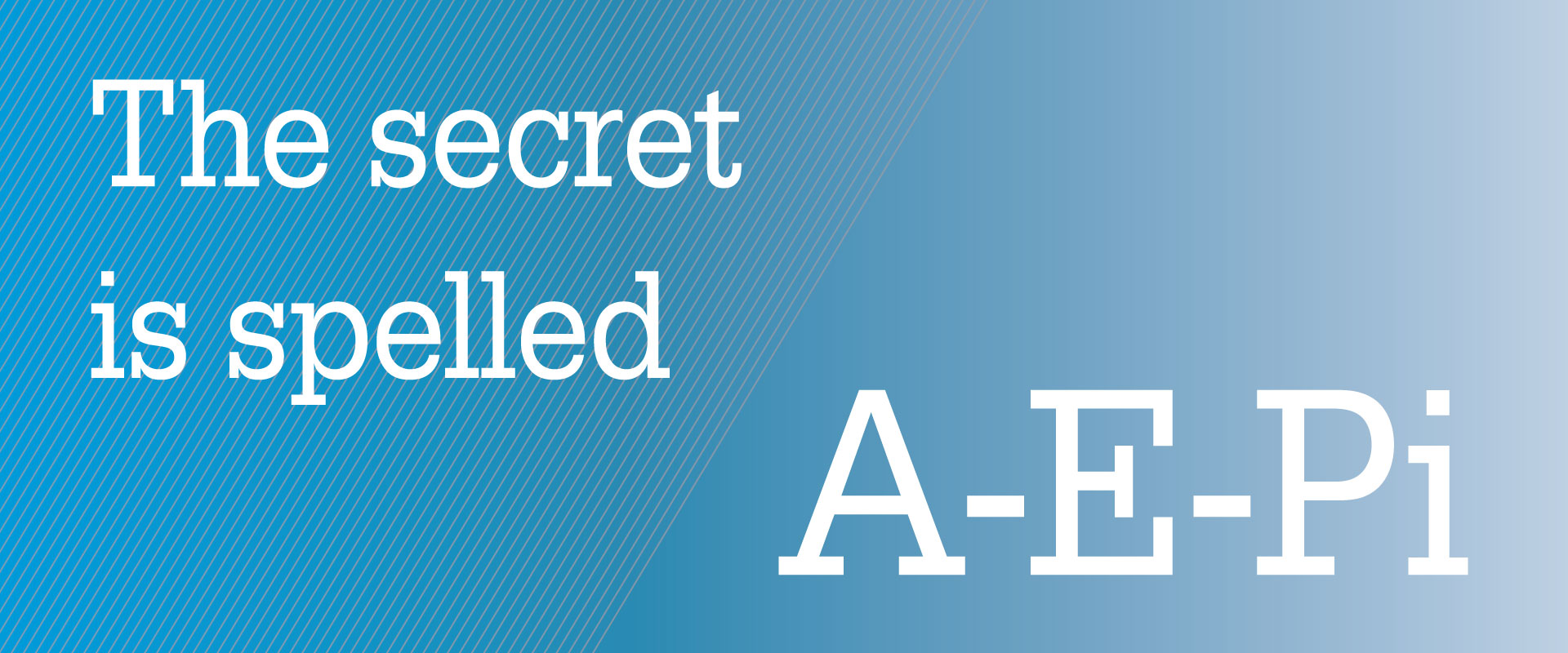The secret to creating pro-Israel youth is spelled AEPi
Hardly a day passes without an article appearing about the situation on college campuses, with the overwhelming majority claiming the campuses are awash in anti-Israel activity and anti-Semitism. Some hysterics have gone so far as to make the irresponsible claim that Jewish students are in danger. Along with these concerns, commentators lament the ignorance of young Jews, their apathy and reluctance to stand up for Israel. Everyone is looking for the silver bullet to energize Jewish students to become pro-Israel activists whose love for Israel is infectious, who have the knowledge to discuss Israel with their classmates, and who have the courage to stand up to the campus bullies. Well, I had to learn Greek, but I have found the silver bullet — Alpha Epsilon Pi (AEPi). According to pollster Frank Luntz, “no one has had a greater impact and instilled greater confidence among college Jews than AEPi.” What’s the secret to AEPi’s success?
At one time, there were as many as fifteen college fraternities founded by Jewish men. Today AEPi maintains that it is the only one dedicated to Jewish ideals, values, and ethics. Founded in 1913, AEPi currently consists of 188 chapters spread across the United States, Canada, Australia, Austria, Israel, the United Kingdom, and France, and has 104,000 initiated members, including about 12,000 current undergraduates. Although AEPi is a Jewish organization, membership is open to all willing to support its purpose and values.
AEPi is not an Israel advocacy organization, but it does not hide its commitment to Israel. The brotherhood, like the Jewish community, has a diversity of views, but “all AEPi brothers understand when they join that they are affiliating with a pro-Israel brotherhood,” explained managing director Jay Feldman.
AEPi’s mission is to sustain the Jewish people by fighting assimilation and training the Jewish leaders of tomorrow. “We give our brothers deep and transformative friendships in a context that teaches leadership, enhances Jewish pride, and imbues a life-long commitment to the Jewish people and the State of Israel,” said Elan Carr, AEPi’s past international president.
The formula works. “Every study of Jewish demographics that has sought to measure AEPi’s influence on our students and alumni,” Carr noted, “has concluded that membership in AEPi is one of the greatest predictive factors of Jewish communal involvement and charity, of support and activism for Israel, and of creating a Jewish home and raising Jewish children.”
In 2014, Jewish demographic expert Sid Groeneman conducted a study that found:
Four out of every five AEPi alumni have been to Israel. Approximately, 1,000-2,000 brothers go on Birthright each year and almost half of all AEPi alumni have participated in Birthright since the program began.
Half of all alumni actively supported Israel when in college—a number that has remained the same since graduating.
AEPi has had a major impact on increasing members’ interest in and support for Israel.
AEPi alumni spouses are disproportionately Jewish—intermarriage is lower than average—and their children are being raised Jewish more than others.
Three‐quarters of alumni participated in Jewish organizations or activities besides AEPi while in college.
Alumni are more likely than other young adult Jewish men to express feelings of commitment, connectedness, and pride vis‐à‐vis Judaism and Jews worldwide.
Rates of philanthropic giving are higher than for other Jewish men—both donations to Jewish organizations and to other nonprofits.
“By approaching Jewish identity first from the perspective of Jewish peoplehood and belonging – the essence of brotherhood – and then by providing Jewish content in our chapters,” explains Carr. “The AEPi experience is unlike any other in terms of arousing a deep sense of Jewish pride and an enduring feeling of commitment in our brothers. Those feelings find expression in the strong support for Israel that AEPi exemplifies.”
Carr is an example of the men of character AEPi produces. Now a Deputy District Attorney for Los Angeles County, Carr also serves as an officer in the U.S. Army Reserve and spent nearly a year on military deployment to Iraq, where he helped to lead an anti-terrorism team on life-saving missions throughout the country and prosecuted terrorists who attacked our troops. In 2014, he ran for Congress.
Some of AEPi’s notable brothers include CNN’s Wolf Blitzer, singer/songwriter Art Garfunkel, Facebook founder Mark Zuckerberg, lawyer Alan Dershowitz and actor Gene Wilder (z’’l).
Unlike many organizations today that shy away from using the term “Zionism,” AEPi considers Zionism a central component of Jewish identity. Consequently, the fraternity makes Israel advocacy a focal point of its programs and has created a new chapter chairmanship whose responsibility is to support Israel on their campus. AEPi takes pride in its commitment to “proactively improve Israel’s image on campus, and fearlessly confront Israel’s libelous detractors when they arise,” said Feldman.
Chapters sponsor a broad range of programs. At Kent State, for example, the brothers recently ran a program highlighting Israel’s assistance to Syrians injured in the civil war. In Los Angeles and Philadelphia, chapters sponsored “combating hate on campus” training conferences bringing together people from LGBT, Hispanic, African American, Asian, and feminist groups to learn from each other about their respective struggles.
AEPi also launched a mini-tour with an organization called Artists 4 Israel, a network of non-Jewish street artists who travel to Israel and paint the inside of bomb shelters and provide artist healing kits, both aimed at comforting Israeli children who have been traumatized by acts of terrorism. African American, Hispanic and Lesbian artists on the campus tour convey their impressions of Israel, and experiences meeting victims of terror, while inviting students to help them create graffiti murals of Israel imagery.
The fraternity was not always as active in Israel programming; its involvement arose out of necessity during the second intifada in response to the perception that the campuses were on fire with anti-Israel activity. Today, the fraternity hosts two international Israel conferences each year: a specialized Israel Engagement Track at the fraternity’s annual convention, and an Israel Summit each January. These gatherings provide participants with the facts they need to know about Israel and teach them skills such as public speaking, creative thinking, persuasion, retail engagement, and event management.
One of the most important initiatives has focused on preparing students to run for student government. The anti-Semitic boycott, divestment and sanctions (BDS) campaign has targeted student governments and succeeded in getting a handful of them to consider resolutions calling on their universities to divest from Israel. AEPi’s civic engagement initiative trains students to navigate the ins and outs of student government campaigns and elections, which has resulted in many brothers assuming leadership positions. This has paid off at schools such as Stanford, where AEPi brothers were behind a resolution condemning anti-Semitism, and, at Michigan, where they helped defeat a BDS resolution.
The Greek system places a high value on charity and AEPi understands the importance of communicating the responsibility Jews have for each other. The fraternity brothers are meeting their obligation by committing to donate one million dollars over five years to 10 philanthropic organizations, all of which are Jewish or Israel-related. These charities include B’nai B’rith International’s Disaster Relief Program, the Israel Children’s Cancer Foundation and the IDF Widows and Orphans Organization.
AEPi has also taken to heart my mantra that it is not too late to engage students when they get to college, but it is late. AEPi seeks out Jewish high school students and works with groups such as BBYO and NIFTY to put on educational programs for their teens. The fraternity offers workshops to camps and day schools that teach leadership development and how to stand up for Israel. Jewish summer camps have trouble recruiting male counselors and AEPi is filling the void by recruiting brothers to work in camps and serve as role models.
While not all pro-Israel organizations play well together, AEPi has partnered with a number of groups, including Hillel, Chabad, JNF, Hasbara Fellowships, AIPAC and StandWithUs. “Brothers are at the forefront of defending Israel on campus,” explained Feldman. “They are the tip of the spear.”
One characteristic that distinguishes AEPi from other organizations is its “cool quotient.” The fraternity is an integral part of the Greek system on campus, which allows it to reach students who typically would have no interest in Israel. Hence, Feldman says, “other organizations see us as a delivery system for the pro-Israel community to reach a broad spectrum of students.”
When I asked Carr why a young man should join the fraternity, he said, “AEPi creates lifelong friends and memories; our brothers become prouder Jews, more skillful advocates, and better leaders while having the time of their lives with their best friends. AEPi truly represents the brotherhood of the Jewish people.”
Dr. Mitchell Bard is the author/editor of 24 books including the 2017 edition of Myths and Facts: A Guide to the Arab-Israeli Conflict, The Arab Lobby, and the novel After Anatevka: Tevye in Palestine.
